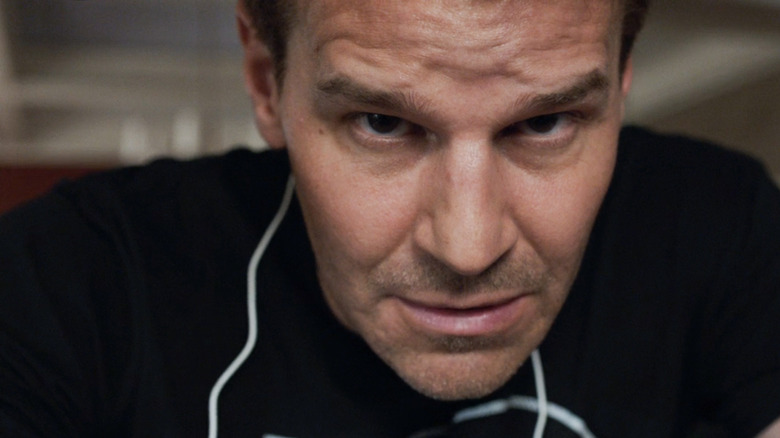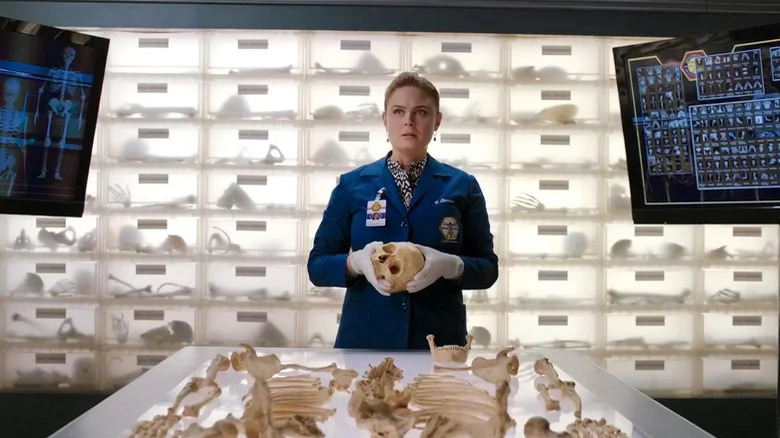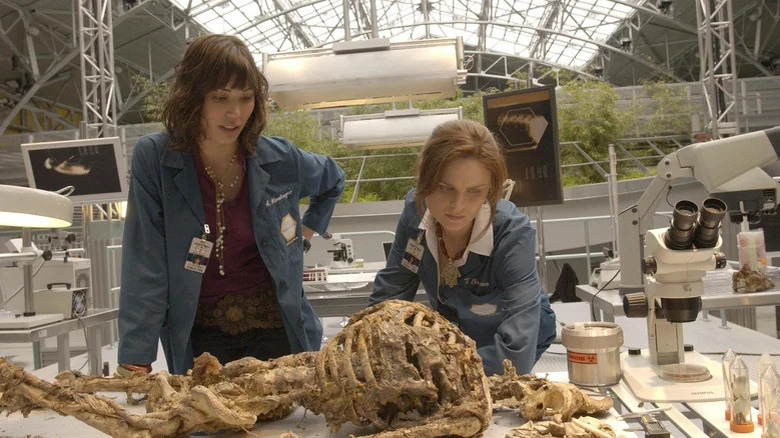Bones' The Ghost In The Machine Perspective Flip Required All Hands On Deck
It may be funnier and more spiritual than "NCIS," but "Bones" is a police procedural at the end of the day — and procedural television implies a formula. With "Bones," that formula centered around a team of investigators led by forensic anthropologist Dr. Temperance "Bones" Brennan (Emily Deschanel) and FBI agent Seeley Booth (David Boreanaz), who solve murder cases by finding clues in human remains. That said, the show was willing to experiment within the confines of this procedure — when a show runs for 12 seasons, it has to. For the 200th episode, "The 200th in the 10th," "Bones" threw its characters into a 1950s-set homage to Alfred Hitchcock films.
The show broke the formula even earlier for its 150th episode (season 8, episode 9) — "The Ghost in the Machine." In this episode, the team finds the skeleton of teenage boy Colin Gibson (Cameron DeFaria), which has been decomposing for two years, and solves his murder. Wait, this sounds like a pretty typical "Bones" episode, doesn't it? The experimentation isn't narrative, but formal: the episode is seen entirely from the "perspective" of Colin's skull.
"The Ghost in the Machine" opens with the characters in the middle of discovering the body, and from there, it's set mostly at the Jeffersonian Institute itself, since that's where Colin's skull rests. "Bones" always splits the difference between the fieldwork and labwork of forensics, but this episode tilts much more towards the latter.
Series creator Hart Hanson (who personally scripted the episode) opened up to The Hollywood Reporter about his self-imposed difficulties writing the episode.
The view from inside the Bones
"The Ghost in the Machine" was directed by Milan Cheylov (one of 10 "Bones" episodes he helmed), who had to craft a distinct visual language. The episode is filmed almost entirely via POV shots from the perspective of Colin's skull, with characters often speaking directly to the skull. To mimic a human's point-of-view, the framing is imprecise and the camera sometimes shakes (presumably it was handheld). What is smooth are the pans; the camera moves on a 360-degree axis, changing view quickly like a wandering eye.
The episode does not unfold in real-time (there would be too much downtime to fit into 40 minutes). So, instead of simple cuts, transitions are done via plumes of ethereal smoke, which smog up the frame and then disappear to reveal the new location. Hanson admitted to THR that the concept wasn't easy to execute: "[Executive producer Stephen Nathan] had a hard time cutting it, and [Cheylov and his crew] had a tough time shooting it. I painted myself into quite a stylistic corner. Everybody had to help me out."
As a sign that Hanson ultimately needed to escape that corner to resolve the episode, his script only stays confined to the lab for the first two-thirds of the episode. In the last 15 minutes, Bones brings the skull home, convinced Colin's "presence" will motivate her to see the case through. Then, when they've got the suspects pinned, we see the questioning and confession thanks to the skull being in the room as an interrogation tactic.
Ghost in the Bones
Sounds like a lot of contrivances for some camera tricks, huh? Well, the episode's script centers Colin's humanity, and implicitly that of all the other murder victims who have kicked off each "Bones" episode. The shadow hanging over the episode is whether Colin's soul is buried within his mortal remains. In private moments, the characters speak directly to the skull because they're all wondering that themselves.
The episode chooses to definitely answer this question with a "yes." After the murder is solved, Colin's soul leaves his skull, with an upwards zoom-out shot following its journey outwards towards the ceiling. Colin's apparition, standing behind the characters, becomes visible to the audience, and guest-starring psychic Avalon (Cyndi Lauper) even waves goodbye to Colin's spirit once he moves on. The episode's themes are consistent with the series' — Bones' science-only views on life and her work are consistently challenged — but this was a bit too sentimental.
From here on out, the episode goes back to conventional camerawork; the only establishing shots and transitions of the episode come in the concluding minutes. It's imperfect, but "The Ghost in the Machine" is a clever spin on how procedurals can experiment simply by centering a different perspective.


